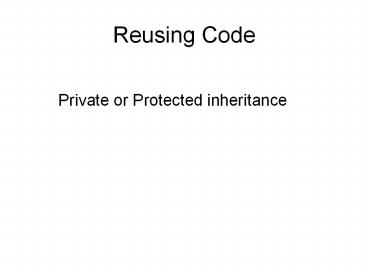Reusing Code - PowerPoint PPT Presentation
Title:
Reusing Code
Description:
... and it supports operation such as summing the contents and defining largest and smallest value. ... return ArrayDb::sum() / ArrayDb::size(); else. return 0; ... – PowerPoint PPT presentation
Number of Views:41
Avg rating:3.0/5.0
Title: Reusing Code
1
Reusing Code
- Private or Protected inheritance
2
A cool class for array
- valarray class deals with numeric values, and it
supports operation such as summing the contents
and defining largest and smallest value. - valarray lt intgt q_values // an array of int
- valarray ltdoublegt weights
3
- double gpa53.1,3.5,3.8, 2.9, 3.3
- valarrayltdoublegt v1
- valarrayltintgtv2(8) // array of 8 int
- valarrayltintgtv3(10,8)
- // array of 8 int each set to 10
- valarrayltdoublegtv4(gpa,4)
- // 4 elements, 4 first values of gpa .
4
Private Inheritance
- Private inheritance implements has-a
relationship. - In private inheritance, public and protected
members of the base class become private members
of the derived class. - Methods of the base class can be used inside the
member function of the derived class.
5
- The public method of the base class becomes
private method of derived class. - The derived class does not inherit the base-class
interface.
6
- class Student private string, private
valarrayltdoublegt - public
- .
- By default inheritance is private. If we dont
use word private the inheritance is private. - If we derive a class from more than one class we
have multiple inheritance.
7
How to initialize base-class component
- Student( const char str, const double pd, int
n) string(str), ArrayDb(pd, n)
8
Accessing Base-Class methods
- double Student Average( )
- if( ArrayDb size() gt 0)
- return ArrayDbsum() / ArrayDbsize()
- else
- return 0
9
Accessing Base-Class Objects
- const string Student Name()
- return (string ) this
- // this is the invoking of type Student
- // here we type cast a Student object to a string
object.
10
Accessing Base-Class Friend
- ostream operator ltlt ( ostream os , const
Student stu) - os ltlt Scores for ltlt( string ) stultlt \n
- .
- // Instead of this we use the stu object.
11
- In private inheritance, a reference or pointer to
a base class can not assign a reference or
pointer to a derived class - with out explicit type cast.
- Even if we used public inheritance we would have
to use explicit type cast. - osltltstu //recursive call.
12
Protected Inheritance
- A variation of private Inheritance
- class Student protected string, protected
valarrayltdoublegt - .
- The interface for the base class is available to
the derived class but not to the outside world.
13
- Difference between private and protected
inheritance is - With private inheritance the third generation
class doesnt get the internal use of the base
class interface. - With protected inheritance public base class
methods become protected in the second generation
and are available internally to the next
generation (third).
14
Note on constructors
- Base class is always constructed first
- If no explicit arguments are passed to base class
- Default constructor will be called
- Destructors are called in exactly the reverse
order of the constructors.
15
Name Hiding
- If you redefine a member function in the derived
class, all other overloaded functions in the base
class are inaccessible.
16
Access protection
- Members
- Public visible to all clients
- Protected visible to classes derived from self
- (and to friends)
- Private visible only to self and to friends!
- Inheritance
- Public class Derived public Base ...
- Protected class Derived protected Base ...
- Private class Derived private Base ...
- default
17
How inheritance affects access
Suppose class B is derived from A. Then
Base class member access specifier
18
When is protected not protected?
- Protected is public to all derived classes
- For this reason
- make member access functions protected
- keep member variables private
Base Class
Client
Derived class
19
Overriding
- Overriding redefines the body of a virtual
function - class Base
- public
- virtual void func()
- class Derived public Base
- public
- virtual void func()
- //overrides Basefunc()
20
Calls up the chain
- You can still call the overridden function
- void
- Derivedfunc()
- cout ltlt "In Derivedfunc!"
- Basefunc() // call to base class
- This is a common way to add new functionality
- No need to copy the old stuff!
21
- class Array
- private
- int len
- int arr
- public
- Array (int ln0)
- Array (const Array rs)
- Array() delete arr
- Array operator (const Array rs)
- Array operator(const Array rs)
- int Size( ) return len
- int operator ( int i)
22
- int Arrayoperator ( int i)
- if( ilt0 igtn)
- coutltlterror in array lim ltlt out of rang
ltltendl - exit(1)
- return arri
23
- Array Arrayoperator(const Array rs)
- int i,t
- if (len gt rs.len) tlen
- else trs.len
- Array new_array(t)
- for(i0iltki)
- new_arrayiarrirs.arri
- for(i,iltleni) new_arrayiarri
- for(iiltrs.leni) new_arrayirs.arri
- return new_array
24
- Array Arrayoperator(const Array rs)
- if (this rs )
- return this
- delete arr
- arrnew intrs.len
- for(int i0iltleni)
- arrirs.arri
- lenrs.len
- return this































